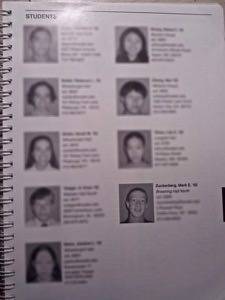By now, we are all familiar with Mark Zuckerberg’s success story. The explosive international growth of Facebook to over 200 million users continues to land the young founder and CEO in top news stories worldwide. Recently, Time Magazine named Zuckerberg one of the world’s most influential people of 2008, and Fast Company named Facebook number 15 in its list of the world’s 50 most innovative companies of 2009. At just 23 years of age, Zuckerberg even briefly made Forbes’ 400 richest Americans list, temporarily giving him the title of World’s Youngest Billionaire.

However we have heard very few stories about Zuckerberg and the inspiration behind Facebook during the period prior to February 4th, 2004, the day he launched Facebook from his Harvard dorm room. In this post we tell that story.
The stories we hear these days about Zuckerberg in popular media tend to follow a common sensationalist pattern: “super-smart kid invents a tech phenomenon from his Harvard dorm room, drops out, and changes the world.” It’s a classically framed, Bill Gates-esque story of success driven by intelligence and ambition. What’s most intriguing about the Zuckerberg story, however, isn’t that he dropped out of Harvard and became a billionaire at 23.
The reason we hear so little about Zuckerberg’s pre-launch vision for Facebook (which was originally called thefacebook.com) is likely because he has been a controversial target over the true origins of his business. In 2007, several of Zuckerberg’s classmates came forward and claimed rights to the Facebook idea after reports surfaced that Yahoo had offered $900 million to purchase Facebook just two years after the founding of the company. Even though the suit against Zuckerberg was settled last year, given the nature of the proceedings, we’ll likely never get an official answer from Zuckerberg himself about the true origins of his inspiration. But maybe we don’t need one after all?
It turns out that Zuckerberg’s academic history offers a great deal of insight into the inspiration for Facebook and why it was so wildly successful when it first launched. February 4th, 2004 may mark a major milestone in Facebook’s history, but the story of Mark Zuckerberg’s rise to fame in fact starts years before he stepped foot on the Harvard campus, and is much more complex and interesting than is usually portrayed.
Pre-Zuckerberg: Tracing the Roots of Facebook Culture
You may be surprised to hear that while Harvard was fertile ground for the launch of Facebook, the seed of the concept was likely planted in Zuckerberg in high school. You never hear about Zuckerberg’s alma mater Phillips Exeter Academy in stories because Harvard was where the action really started (and the Harvard name, to some extent, validates Zuckerberg’s smarts and makes for a more sensational story). But in fact, the time that Zuckerberg spent at the academy from 2000 to 2002 likely had more influence on the name and initial concept of Facebook than any of his classmates at Harvard.

Phillips Exeter Academy (or “Exeter”) is a private boarding school for grades 9 to 12, located in Exeter, New Hampshire. The prestigious prep school is a member of the Ten Schools Admission Organization, which includes such famous boarding schools as Phillips Andover, Deerfield Academy, St. Paul’s, and Choate Rosemary Hall. Like the other “Big Tens,” Exeter has a tight-knit boarding community that lives on campus full time. Students refer to themselves as “Exonians” and have a strong group identity rooted in a rich culture of customs and tradition.
An Exonian for two years, Zuckerberg had plenty of time to observe and participate in the social culture and rhythms ingrained in Exeter’s boarding lifestyle. Every year, the school says goodbye to a few hundred students and welcomes a few hundred more. Zuckerberg enrolled in the fall of his junior year and, like every new and returning student, received his own copy of Exeter’s student directory, “The Photo Address Book,” which students affectionately referred to as (you guessed it!) “The Facebook.”


We interviewed several of Zuckerberg’s peers this week, and they all confirmed what David W. Farrant (class of 2000) had to say:
“The front cover says “The Photo Address Book,” but we all called it “The Facebook” all the time because “The Photo Address Book” was such a mouthful. Everybody called it that.”
“Facebook” photo directories were (and still are) a huge part of the students’ social experience and culture at prep schools such as Exeter. Every school in the Big Ten prints and distributes one for its students annually. When students arrive on campus each fall, the rhythm of their social lives is predominantly set by their dormitories, their class year (i.e. seniority), and their proximity to friends in other houses. Because students aren’t allowed cell phones on campus and living accommodations are in such flux from year to year (they change houses and phone numbers annually), these “Facebooks” are a valuable resource for students.
Of course, not only do students need the directory to find and contact their peers, but the books become part of the culture of bonding between classmates and friends, as students use it to see where their peers live, who’s hot and who’s not, who lives with who, and who the new kids are. Sounds an awful lot like how people use Facebook online now, right? Of course, it also describes an early pre-Internet social culture, facilitated by photo directories, that students enjoyed long before Zuckerberg even made it to high school, a culture he happened upon and got to participate in by a stroke of pure luck and glorious opportunity.
But the story doesn’t end there. In Zuckerberg’s senior year, the student council, headed by student body president Kris Tillery, successfully lobbied the administration to have the school’s IT department put the full contents of Exeter’s Photo Address Book online. By the time Zuckerberg graduated, the website was put up at http://student.exeter.edu/facebook, with the URL directory (i.e. “facebook”) named after the students’ pet name for the physical book and effectively shortened to something useful. Tillery was unavailable for comment.
In our interviews, some of Zuckerberg’s peers pointed us to this screenshot of the original website hosted on the school’s .edu domain. The screenshot was posted in the public Facebook group “Exonians” in 2006 and is still there. Some of the comments about the screenshot (which date back to 2007) refer to it as “the original Facebook” and refer to the Photo Address Book as “the physical Facebook.”

Of course, the school’s student.exeter.edu/facebook website is no longer online, and none of our sources were able to confirm whether Zuckerberg himself was involved in, or responsible for, the student council initiative that got the directory online in the first place. All we know is that students were enthusiastic enough about an online version of the physical directory that the student council made an effort to lobby the administration, that the online directory was created during Zuckerberg’s senior year, and that he was likely aware of its existence.
A More Complete Picture of the Facebook Success Story
Now that Facebook has graduated from its academic roots and been released to the world for free, its continued growth has many experts saying it will likely be the dominant social platform for the foreseeable future. At 200 million users (and counting), Facebook makes it hard to doubt that it will have considerable influence in the way we all connect and communicate in the future, both locally and across borders. While we may never know the true origins of Mark Zuckerberg’s inspiration for Facebook, looking at the social culture of the prep school he attended and his experiences as a boarding student there offer us insight into where the explosion of global Facebook culture may have begun, why it was so successful when it launched at Harvard, and how luck and opportunity may have led one of the world’s youngest visionaries to start coding in his college dorm room.
Steffan Antonas is a technology anthropologist, writer, and blogger who currently lives in San Diego, CA. He began studying human behavior in virtual communities as a graduate student in Georgetown University’s Communication Culture and Technology (CCT) Program in 2003. He has worked in Southern California as an IT Professional for the past three years. You can contact Steffan at [email protected] and on Twitter @steffanantonas.
Image credits: Phillips Exeter Academy by etnobofin. Book cover and Mark Zuckerberg photos by Alex Demas and Mark Flores.










